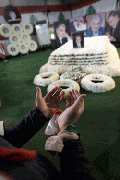
|
| A supporter of Lebanon’s outgoing premier Saad al-Hariri prays at the grave of assassinated former prime minister Rafiq al-Hariri, during a protest against the appointment of Najib Mikati as Prime Minister, in Beirut January 26, 2011. Hundreds of angry protesters burnt tyres and blocked roads across Lebanon on Tuesday after Mikati, a Hizbullah-backed politician, was named prime minister, shifting the balance of power in the country towards Syria and Iran.REUTERS/Sharif Karim |
It hasn’t quite turned out that way, primarily due to foreign powers using Lebanon to battle for regional influence. Disunity is Lebanon’s greatest Achilles heel, which is now being exacerbated by the UN-backed Special Tribunal for Lebanon, which is bent on opening-up old wounds with the potential to thrust the country into civil war.
There is no doubt that Lebanon’s former Prime Minister Rafiq Hariri was a great man, who worked hard to rebuild his nation and bring his people together. His reconstruction of Downtown Beirut is a testament to that. His killing in 2005 was a terrible crime and not only a tragedy for Lebanon but also for the region. But allowing a foreign court to regurgitate that tragedy six years with potentially devastating consequences serves no purpose at all for Lebanon’s stability and economic future.
It does, however, benefit the U.S. and Israel which are ready to cheer on the demonization of their enemy Hizbullah, which is the only entity blocking those powers from total domination over Israel’s tiny neighbor and giving them pause for thought to pursue their ambitions to bomb Iran’s nuclear sites.
Lebanon’s so-called unity government wasn’t perfect but it was largely workable. It fell apart when outgoing Prime Minister Saad Hariri (now caretaker prime minister) visited the US President Barack Obama. He subsequently confirmed his support for the tribunal’s findings and upcoming indictments against members of Hizbullah, whose leader Hassan Nasrallah has consistently denied any involvement in the killing.
While it’s understandable that Saad Hariri is keen to bring his father’s murderers to justice, he should not do so at the expense of peace. Whatever a foreign court comes up with will not bring his father back but may lead to further bloodshed in his name.
Further, the entire UN supported exercise lacks credibility. Firstly, former Lebanese Prime Minister Fouad Siniora was not empowered under the Lebanese constitution to hand jurisdiction over to foreigners without parliamentary approval, which was not sought.
Secondly, the tribunal’s critics say there is no precedent under international law for the UN to investigate the assassination of one individual when such UN-backed special tribunals and the International Criminal Court in The Hague concerns themselves with war crimes, genocide or crimes against humanity. The murder of Hariri should have remained an internal matter; farming its investigation out is akin to the Lebanese government giving away its country’s sovereignty and undermining its own policing and judiciary systems.
Nasrallah says the Tribunal is no more than a political tool manipulated by Washington and Tel Aviv and he may well be right. He wants the Memorandum of Understanding to be revoked saying, he would not allow Hizbullah’s “reputation and dignity to be tarnished” and will not be held responsible for the blood of Rafiq Hariri.
Why would the UN Security Council agree to launch such a protracted and expensive investigation into one man’s death, mostly at the instigation of the US and France, unless there was some kind of worthwhile endgame?
In reality, there has already been a substantial political pay-off that was based on a pack of lies. The Mehlis Report wrongly cited Syria as the culprit on the basis of testimony from false witnesses, which brought the full weight of the international community on Damascus and elicited a wave of anti-Syrian revulsion within Lebanon. The fall-out from those fabrications led to the withdrawal of the Syrian military and intelligence services from Lebanon and calls for stringent anti-Syrian sanctions in the U.S. Congress.
As it happened, the Syrian pullout was long overdue; the Syrians had long over-stayed their welcome. But that doesn’t detract from the fact that it was engineered in a cynical, underhand manner masquerading as justice. Saad Hariri has since apologized to Damascus, admitting mistakes “that harmed the Syrian people and relations between the two countries… this was a political accusation, and this political accusation has finished.”
When Judge Detlev Mehlis got it so wrong, and Saad Hariri has admitted there was a political component in that report, why on earth should the Lebanese people trust his successors to get it right? If the UN inquiry is acknowledged to have been politically driven in the past, then, surely, it is just as likely to be so now.
Another strange aspect to this affair is the reluctance of Saad Hariri to refer the individuals who bore false witness against Syria to the Lebanese judiciary. Those people, who variously say they were paid or tortured to lie, are surely the key to discovering who orchestrated the crime.
As a new Lebanese government is in the process of being formed, Nasrallah says he will accept no cabinet prepared to protect the false witnesses. The Syrian President Bashar Assad is also eager to ensure the false witnesses are brought to court and, last September, asked Hariri for an “honest and official stance” on the matter.
Saudi Arabia and Syria have been working closely with the Lebanese authorities on an initiative to end the crisis but it is believed that US Secretary of State Hillary Clinton made it known that the US would not accept any solution prior to the Special Tribunal for Lebanon’s indictments are made public. Those who insist that the tribunal isn’t being used by the West as a political tool to damage Hizbullah when it has already fired its barrels at an innocent party Damascus should reflect upon Clinton’s words and think again.
Reprinted from Arab News, a leading Saudi English daily newspaper. The author can be reached at: Sierra12th@yahoo.co.uk.






Leave a Reply